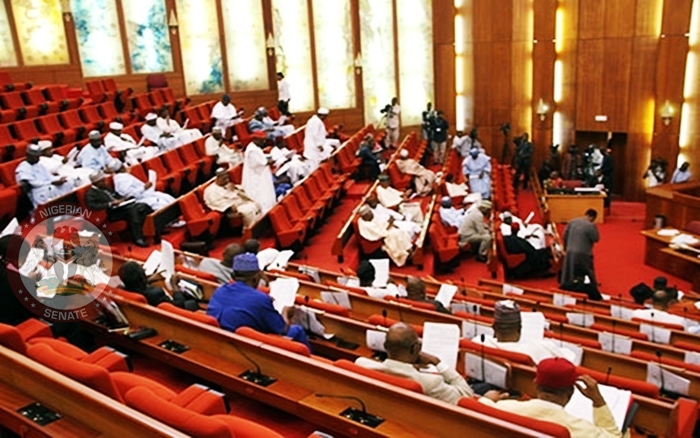The Nigerian Senate has slammed the Central Bank of Nigeria, CBN, and commercial banks in the country over lending rates of about 30 per cent which the lawmakers described as prohibitive.
This is even as the upper Chamber directed it’s Committee on Banking, Insurance and other financial institutions, Finance and Legislative Compliance to probe the ‘prohibitive’ lending rate of commercial banks in the country.
The panel, according to the Senate, is to “investigate the rationale behind the huge difference between deposit and lending interest rates as obtained among commercial banks and other financial institutions” in the country.
The position of the Upper Chamber followed a motion titled: “Urgent need to reduce the gap between lending interest rate and deposit interest rate among commercial banks and other financial institutions”, sponsored by Senator Solomon Adeola (Lagos West).
Mr Adeola in his lead debate noted that there is a huge divergence between the deposit and lending rates in Nigeria.
READ ALSO: Emefiele under pressure to transfer Anchor Borrowers Programme to Agric Ministry
He said that the Senate is worried that Nigeria’s current lending rate is one of the highest in the world.
He said that savings deposit rate as at December 2019 was 3.89 per cent while the prime and maximum lending rates were 14.99 per cent and 30.72 per cent in the same period.
He said that while the nation’s prime lending rate is 14.99 per cent, “loans are available in the commercial banks and other banks at an interest rate of between 22 and 27 per cent.”
He said that the CBN has failed to balance the deposit interest rate and lending rate with the goal of encouraging savings.
He further expressed worry that Nigeria’s inflation rate has risen to 11.98 per cent as at December 2019.
“This is the highest inflation rate between January and December 2019.
“Latest data from the National Bureau of Statistics also shows that the inflation rate further rose from 11.98 per cent in December 2019 to 12.13 per cent in January 2020.
“This development negatively affects the deposits of commercial bank customers in addition to the low interest rates on deposits.”
He insisted that it was disturbing that the interest rate spread in some other African countries is not as wide as that of Nigeria.
“For instance, in Kenya, the deposit rate, savings rate and lending rate as at September 2019 were 6.89 per cent, 4.58 per cent, and 12.47% respectively.
“South Africa’s overnight deposit rate and lending rate as at February 20th, 2020 were 6.34 per cent and 9.75 per cent respectively.
“Further disturbed that the base rate in India ranges from 8.45 – 9.40 per cent vis-à-vis a savings deposit rate of 3.25 – 3.50 per cent.
“Fixed Deposits (FDs) in India interest rates range from 4.50% per annum to 5.75% per annum for deposits with a tenure of seven days to less than 365 days.
“These deposits are known as short term deposits as they have tenure of less than one year,” he said.
He said that the CBN has failed to apply global best practices in low lending rates to improve the economy and protect the interest of depositors.
“Short term Indian Bank FD rates for senior citizens range from 5.00% to 6.25% per annum but Central Bank of Nigeria is yet to borrow from the good practices of these countries to improve our economy and protect the interest of depositors some of whom are elderly pensioners,” he added.
He said that with higher interest rates, interest payments on credit cards and loans are more expensive which discourages people from borrowing and spending.
“Those who already have loans will have less disposable income because they spend more on interest payments.
“The low consumption this usually occasions will affect production in the real sectors of the economy.”






